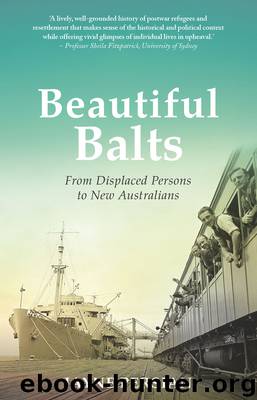Beautiful Balts by Jayne Persian

Author:Jayne Persian
Language: eng
Format: epub
Publisher: NewSouth Publishing
Published: 2017-05-08T16:00:00+00:00
CHAPTER 5
Inside the Cold War
Australia has their bodies. Europe still has their minds.
– Sun-Herald, 19541
Vladímir Ležák-Borin was a postwar enigma, a Czech migrant to Australia who was much more than he seemed. Arriving at the tail end of the postwar DP scheme, contemporaries described Borin as a ‘fraud’, someone from the ‘political underworld’. Borin’s somewhat convoluted jour-neys, both political and geographical, allow us to glimpse into the life of an active displaced person from the political elite.
Borin’s life also points to the ambiguities inherent in disrupting grand narratives: in this case, the idea that DPs were politically uncomplicated New Australians. Borin left the Communist Party after a visit to Moscow in 1934, and was possibly a Nazi agent in Paris. In London he provided information to Czech communist agents. Denied British citizenship, he arrived in Australia in 1952 where he wrote the first DP novel and advocated for displaced persons on various issues with federal politicians. He also continued his political activity, associating with the far-right Australian League of Rights, and working with the Democratic Labor Party.
Borin left Australia in the mid-1960s. His journey back to the Soviet Union and his death is a matter of conjecture. Was he invited to return to Prague by the Czech leader Alexander Dubček in 1967 during the Prague Spring, and killed during the Soviet invasion the following year? Or did he die, of natural causes, in Czechoslovakia in 1970? Was he a ‘world traveller’ and ‘complete cosmopolite’, a political ‘adventurer’ or a sleeper agent for the communists?
Before we continue Borin’s story, let’s look at the milieu of 1950s Australia and the DP diaspora.
Nationalist diasporas
While the Australian Government encouraged the assimilation of individuals, a number of DPs saw themselves as members of specific national and ethnic groups striving for national and cultural preservation in diaspora. Some desperately held on to the past, through language and memory. Others eagerly participated in a growing Cold War discourse of anti-communism, as first-hand witnesses to the evils of the Soviet Union, or as outspoken anti-communist activists.
As in postwar Europe, DPs drew lines on ethnic and nationalist grounds at the first opportunity. Forced together in Australian migrant and work camps, displaced persons quickly formed social and political groups to preserve their marginalised cultural traditions and identity. Such groups aimed to ‘build culture within a culture’, that is, to continue the nationalist building work begun in European DP camps.2
This occurred through DP organisations such as churches, choirs, theatre and dance groups, discussion groups, libraries, sporting groups and political associations. By 1953, every DP nationality was represented in the 38 nationality-specific groups in Sydney alone. A journalist observed how
the stronger national groups in Sydney already have established themselves in clubs or societies. They are usually unlicensed clubs, often run in conjunction with a café … They specialise in musical evenings, dances, socials, chess tournaments, and ear-bashing sessions about national, racial and political problems 12 000 miles away.3
Schools, choirs and dancing groups provided a structural ‘framework for the community’, and proved to be ‘a bright spot on an otherwise dark background of hard daily toil’.
Download
This site does not store any files on its server. We only index and link to content provided by other sites. Please contact the content providers to delete copyright contents if any and email us, we'll remove relevant links or contents immediately.
| Arms Control | Diplomacy |
| Security | Trades & Tariffs |
| Treaties | African |
| Asian | Australian & Oceanian |
| Canadian | Caribbean & Latin American |
| European | Middle Eastern |
| Russian & Former Soviet Union |
The Secret History by Donna Tartt(16623)
The Social Justice Warrior Handbook by Lisa De Pasquale(11489)
Thirteen Reasons Why by Jay Asher(7788)
This Is How You Lose Her by Junot Diaz(5772)
Weapons of Math Destruction by Cathy O'Neil(5037)
Zero to One by Peter Thiel(4824)
The Myth of the Strong Leader by Archie Brown(4789)
Promise Me, Dad by Joe Biden(4447)
Beartown by Fredrik Backman(4419)
Stone's Rules by Roger Stone(4415)
How Democracies Die by Steven Levitsky & Daniel Ziblatt(4399)
The Fire Next Time by James Baldwin(4343)
100 Deadly Skills by Clint Emerson(4078)
A Higher Loyalty: Truth, Lies, and Leadership by James Comey(4033)
Rise and Kill First by Ronen Bergman(4012)
The David Icke Guide to the Global Conspiracy (and how to end it) by David Icke(3882)
The Farm by Tom Rob Smith(3872)
Secrecy World by Jake Bernstein(3782)
The Doomsday Machine by Daniel Ellsberg(3731)
